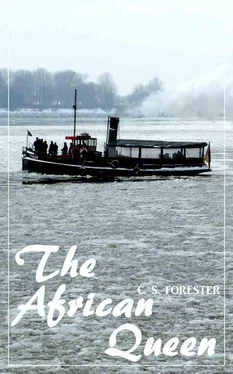‘Come on,’ said Rose. ‘Aren’t we going to start?’
‘Wot, now, miss?’
‘Yes, now. Come along.’
Allnutt was up against hard facts again. It was enough in his opinion to have agreed with the lady, to have admitted her to be right as a gentleman should. Allnutt’s impression was that they might start tomorrow if the gods were unkind; next week if they were favourable. To set off like this, at half an hour’s notice, to torpedo the German navy seemed to him unseemly, or at least unnatural.
‘There isn’t two hours of daylight left, miss,’ he said, looking down the backwater to the light on the river.
‘We can go a long way in two hours,’ said Rose, shutting her mouth tight. In much the same way her mother had been accustomed to saying ‘a penny saved is a penny earned’, in the days of the little general shop in the small north country manufacturing town.
‘I’ll ’ave to get the ole kettle to boil agine,’ said Allnutt.
Yet he got down from his seat and took up his habitual attitude beside the engine.
There were embers still glowing in the furnace; it was only a few minutes after filling it with wood and slamming the door that it began its cheerful roar, and soon after that the engine began to sigh and splutter and leak steam. Allnutt commenced the activities which had been forced upon him by the desertion of his two Negro hands—winding in the anchor, shoving off from the bank, and starting the propeller turning, all as nearly simultaneously as might be. In that atmosphere, where the slightest exertion brought out a sweat, these activities caused it to run in streams; his dirty jacket was soaked between his shoulder-blades. And, once under way, constant attention to the furnace and the engine gave him no chance to cool down.
Rose watched his movements. She was anxious to learn all about this boat. She took the tiller and set herself to learn to steer. During the first few minutes of the lesson she thought to herself that it was a typical man-made arrangement that the tiller had to be put to the right to turn the boat to the left, but that feeling vanished very quickly; in fact, under Allnutt’s coaching, it was not very long before she even began to see sense in a convention which spoke of ‘port’ and ‘starboard’—Rose had always previously had a suspicion that that particular convention had its roots in man’s queer taste for ceremonial and fuss.
The voyage began with a bit of navigation which was exciting and interesting, as they threaded their way through backwaters among the islands. There were snags about, and floating vegetation, nearly submerged, which might entangle the screw, and there were shoals and mudbanks to be avoided. It was not until some minutes had elapsed, and they were already a mile or two on their way, that a stretch of easy water gave Rose leisure to think, and she realized with a shock that she had left behind the mission station where she had laboured for ten years, her brother’s grave, her home, everything there was in her world, in fact, and all without a thought.
That was the moment when a little wave of emotion almost overcame her. Her eyes were moist and she sniffed a little. She reproached herself with not having been more sentimental about it. Yet immediately after a new surge of feeling overcame the weakness. She thought of the Königin Luise flaunting her iron-cross flag on the Lake where never a white ensign could come to challenge her, and of the Empire needing help, and of her brother’s death to avenge. And, womanlike, she remembered the rudenesses and insults to which Samuel had patiently submitted from the officialdom of the colony; they had to be avenged, too. And—although Rose never suspected it—there was within her a lust for adventure, patiently suppressed during her brother’s life, and during the monotonous years at the mission. Rose did not realize that she was gratified by the freedom which her brother’s death had brought her. She would have been all contrition if she had realized it, but she never did.
As it was, the moment of weakness passed, and she took a firmer grip of the tiller, and peered forward with narrowed eyelids over the glaring surface of the river. Allnutt was being fantastically active with the engine. All those grey pencils of steam oozing from it were indicative of the age of that piece of machinery and the neglect from which it had suffered. For years the muddy river water had been pumped direct into the boiler, with the result that the water tubes were rotten with rust where they were not plugged with scale.
The water-feed pump, naturally, had a habit of choking, and always at important moments, demanding instant attention lest the whole boiler should go to perdition—Allnutt had to work it frantically by hand occasionally, and there were indications that in the past he or his Negro assistants had neglected this precaution, disregarding the doubtful indication of the water gauge, with the result that every water-tube joint leaked. Practically every one had been mended at some time or other, in the botched and unsatisfactory manner with which the African climate leads man to be content at unimportant moments; some had been brazed in, but more had been patched with nothing more solid than sheet iron, red lead, and wire.
As a result, a careful watch had to be maintained on the pressure-gauge. In the incredibly distant past, when that engine had been new, a boiler pressure of eighty pounds to the square inch could be maintained, giving the launch a speed of twelve knots. Nowadays if the pressure mounted above fifteen the engine showed unmistakable signs of dissolution, and no speed greater than four knots could be reached. So that Allnutt had the delicate task of keeping the pressure just there, and no higher and no lower, which called for a continuous light diet for the furnace and a familiarity with the eccentricities of the pressure gauge which could only be acquired by long and continuous study. Nor was this attention to the furnace made any easier by the tendency of the wood fuel to choke the draught with ash—Allnutt, when stoking, had to plan his campaign like a chess player, looking six moves ahead at least, bearing in mind the effect on the draught of emptying the ash pan, the relative inflammability of any one of the half a dozen different kinds of wood, the quite noticeable influence of direct sunlight on the boiler, the chances of the safety valve sticking (someone had once dropped something heavy on this, and no amount of subsequent work on it could make it quite reliable again) and the likelihood of his attention being shortly called away to deal with some other crisis.
For the lubrication was in no way automatic nowadays; oil had to be stuffed down the oil-cups on the tops of the cylinders, and there were never less than two bearings calling for instant cooling and lubrication, so that Allnutt when the African Queen was under way was as active as a squirrel in a cage. It was quite remarkable that he had been able to bring the launch down single-handed from the mine to the mission station after the desertion of his crew, for then he had to steer the boat as well, and keep the necessary look-out for snags and shoals.
‘Wood’s running short,’ said Allnutt, looking up from his labours, his face grey with grime, and streaked with sweat. ‘We’ll have to anchor soon.’
Rose looked round at where the sun had sunk to the treetops on the distant bank.
‘All right,’ she said, grudgingly. ‘We’ll find somewhere to spend the night.’
They went on, with the engine clanking lugubriously, to where the river broke up again into a fresh batch of distributaries. Allnutt cast a last lingering glance over his engine, and scuttled up into the bows.
‘Round ’ere, miss,’ he called, with a wave of his arm.
Читать дальше












